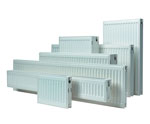In certain rooms, and under certain conditions, compact heaters are most appropriate choice of heater. However, some people avoid using them entirely because they assume that their size means that they do not provide sufficient heat.
This is simply not true. Compact radiators and heaters can produce sufficient warmth for the room. As long as you’ve sized it correctly and chosen a heater/radiator that provides the correct amount of British thermal units per hour for the size of the room.
The reason that the myth exists (i.e. the myth that smaller radiators are worse) is because older radiators had single panels. In those days, the size of the radiator (in height, width, and length) had a direct relationship with the amount of heat that unit could produce.
This is no longer the case. Today, we have improved the technology to such an extent that we can derive a lot of heat from a small radiator. Certainly in comparison to older radiators, compact heaters and radiators can be vastly more efficient.
Why are compact radiators more efficient than many people supposed? It comes down to advances in technology. Here are some of these technologies:
1. Multi panels:
The myth that size matters has a grain of truth in it. It is not size per se that matters, but surface area. If you can increase the surface area of a radiator, then you can increase the amount of heat that it can produce.
One way of doing this is to increase the number of panels in a radiator. Older radiators consisted of a single panel, but nowadays many radiators have triple panels, and the vast majority have at least two panels.
This means that a compact heater with triple panels measuring 1m x .5m will produce more heat than a larger radiator of 3m x 1.5m.
2. Convector fins:
This is another way to increase surface area. The fins sit between the panels in a zigzag fashion and increase the surface area by a significant degree. Some radiators have double fins.
These two technologies alone mean that compact radiators are far more efficient than they used to be, and that they can produce more heat that many people assume. The important thing when looking for new radiators is to buy a unit that provides enough British thermal units per hour for the room.
Are you interested in buying new radiators? If you are, please visit http://www.designerradiatorsdirect.co.uk/.



